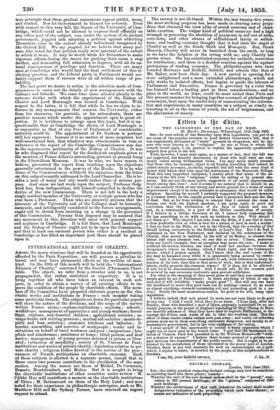trttEro to Ibt Calor.
THE SACREDNESS OF THE DAY OF REST.
St. Mark's Parsonage, Whiteehapel, 11th Jufy 1986. Srn—In your article of last Saturday upon Mob Legislation, you pot it as one cause of the popular aversion to Lord' Robert Grosvenor's bill, that it was suspiciously advocated on " social " grounds by clergymen, and by
men who who were known to be "religious." As one of those to whom this remark would apply, I am anxious to explain the apparently questionable support thus given to the bill. First, however, I must state again, as a matter of fact, that the hill was not supported, but heartily denounced, by those who hold what am com- monly called strong Sabbatarian views. You may easily satisfy yourself that those who, for example, object to all Sunday travelling that cannot he called strictly necessary, as sinful, regarded this bill with the same kind of -horror with which they look upon the endowment of the Maynooth College. With this very important exception, I readily allow that many of the ad- vocates of the bill were "religious," either by calling or by general cha- racter. But are not the most active supporters of all social improvements found among this class ? And it seems to me natural that it should be so, as I can scarcely think of any strong and secure ground for a desire of social improvement except it be some principle or persuasion that would be called religious. Speaking for myself, I certainly supported the proposed *measure, in a former letter, on the express ground that it protected Rest and the Day of Rest. But, so far from wishing to conceal that I connect the cause of human rest with the highest sanction, I am quite ready to avow my conviction that the alternation of six days of labour and one of rest, in a community, is a part of the Divine constitution of society. If I believe in a Divine Governor at all, I cannot help supposing that He has something to do with such an institute as this. Why -should I not think so ? Why should I not take from the Bible, if :I can find it there, a clear profitable view of what is best for a nation of men in such a matter? I find no hint in the Bible, no law in the Church, that the worship of God should belong exclusively to the Sabbath or Lord's Day. Butt do 'find it -explained in the New Testament, and declared by the ordinances -of -the Church, that society is entitled, by the will of its Maker, to abstain from labour and enjoy common rest, on one day in seven. I learn, moreover, from our Lord's example, that an exception may prove the rule. I make no artificial distinction between one kind of work and another—between -the clergyman's labour on Sunday, which I think right, and the trafleaman's labour, which I protest against. But I know that the real repose of the day may be harassed away while it is apparently being secured by. restric- tions : and it therefore seems reasonable to ask, with reference to every in- fraction of the rule, does this or that piece of work, this or that individual's labour really promote the common repose ? If it does, let it be allowed ; if not,' let it be discountenanced. And, I would add, let the common good be secured by. any necessary restraints upon private selfishness. For what is the meaning of that novel piece of cant that you cannot make people good by act of Parliament ? Is there anything of which it can be said that it will infallibly "make people good" ? But will any one have the hardihood to assert that good laws can do nothing—cannot do as much as almost anything—towards restraining evil and promoting good in a na- tion ? Surely the most momentous results, 'for good or for evil, hang upon legislation. I believe, indeed, that acts passed by mobs are not very likely to do good to any one. I wish I could think they do no harm. I hope that, after last Sunday, those who described a mob of idlers, expressly summoned for an un- manly purpose, as the people'of England legislating on their Champ de Mars, are heartily ashamed of what they have done to degrade Parliament, to dis- courage the Police, and, worst of all, to libel the working class. But the effect of these recent events cannot soon pass away ; and surely all reflecting persons must see in them something ominously dangerous, not merely to re- presentative government, but to the very_existence of the nation. I avail myself of this opportunity to correct a hasty expression which I ought not to have used in my former letter. I said•that the threatened vio- lation of Victoria Park was persisted in by Sir William Molesworth " with- out a shadow of excuse." I believe there is some pretext of a private com- pact between two departments of the public service. But it ought to be ex- ,plained for the satisfaction of those interested in the poorer part of Londopt, whether there is any real necessity for such an encroachment on a-park, which, I rejoice to know, is crowded by the people of this neighbonihoodon Sundmvs.


























 Previous page
Previous page